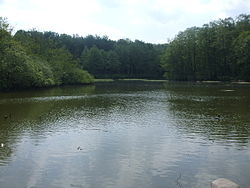Angeln
Modern Angeln, (Danish: Angel; Latin: Anglia, which also means in direct translation from Latin: England), is a peninsula in Schleswig-Holstein, Germany. Ancient Angeln may have been somewhat larger than the Angeln of today, but following the ancient sources it included the territory of modern Angeln.
Angeln has an importance far beyond its small area, as it seems to have been the original home of the Angles who invaded the southern part of Great Britain, which was named after them, England. And so the name of the major world language, English, seems to have taken its name from this little region.
Following the departure of the Angles from Anglia about 350,[1] the region was occupied by Danish settlers not later than the 8th century.
Angeln Media
Physical map of Schleswig-Holstein, showing Angeln in the northeast
Archaeological objects found in Thorsberg Moor, now at Gottorf Castle, Schleswig
References
- ↑ "Gesllschaft für schleswig-holsteinische Geschichte:Angelsachsen". Archived from the original on 2009-02-09. Retrieved 2008-09-25.
Related pages
Other websites
| Wikimedia Commons has media related to Lua error in Module:Commons_link at line 62: attempt to index field 'wikibase' (a nil value).. |
- Crop circles in Angeln Archived 2007-03-11 at the Wayback Machine
- Angeln cattle
- Tourism in Angeln
- Cinarchea (Archaeological films of Schlesvig-Holstein) Archived 2006-09-10 at the Wayback Machine
- County and Municipal Flags (Schleswig-Holstein, Germany) Archived 2016-03-13 at the Wayback Machine
- Genealogy in Schleswig Holstein, Germany








